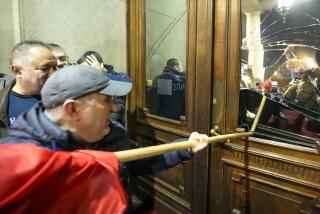Serbian Opposition Plans New Pressures
BELGRADE, Yugoslavia — Frustrated by their failure to extract significant concessions from Serbian President Slobodan Milosevic despite seven weeks of street protest, opposition leaders Tuesday plotted new in-your-face tactics aimed at pressing their demands for electoral justice.
From announcing plans to file criminal charges against officials to urging the deliberate swamping of government switchboards, the opposition is struggling both to sustain its own momentum and to crack Milosevic’s stubborn refusal to cede power.
Students, activists, pensioners and middle-class families have been rallying in Belgrade and other cities for the last 51 days to protest Milosevic’s decision to annul municipal elections won by the opposition Nov. 17.
The demonstrations pose the greatest challenge ever to Milosevic’s nearly decade-old authoritarian rule. Opposition activists have won approval, overt or tacit, from the Serbian Orthodox Church and state institutions.
But the Serbs who really count, such as the police, apparently remain loyal to the president of the country, which with Montenegro makes up the rump Yugoslavia.
With the opposition and Milosevic, who has deployed riot police to contain the demonstrations, at a tense stalemate, opposition leaders are seeking new ways to exert pressure--raising the possibility of escalating violence if either side is provoked.
“We want to break down the state institutions, piece by piece,” said Slobodan Vuksanovic, spokesman for the opposition coalition known as Zajedno (Together).
Zajedno officials said Tuesday that they have identified men in civilian dress who, working alongside police, beat demonstrators after a Dec. 27 rally and left more than 30 people injured.
Zajedno said it would file criminal charges against Interior Minister Zoran Sokolovic and his deputy, Radovan Stojicic, who is said to be close to Milosevic’s powerful wife, Mirjana Markovic.
The two officials stand accused of ordering the beatings. While citizens, under Yugoslav law, may file criminal charges, the likelihood a case would prosper in Milosevic-controlled courts is minimal.
Also Tuesday, opposition leaders said they will mount a new challenge to police blocking marches. Demonstrators will attempt to surround them, strike up conversations and present them with letters.
Vuk Draskovic, a principal opposition leader, walked up to a police commander after the rally Tuesday and wished him a merry Christmas. (Christmas in the Orthodox religion was Tuesday this year.)
In a similar vein, students who have taken a lead role in the demonstrations announced that starting Thursday they will not back down from face-offs with police. It was unclear how far the students are willing to go, but some suggested a sit-in along police cordons.
And in another ploy, opposition leaders urged followers to tie up telephones of all government offices, including the hated state television, by making frequent calls.
“Call them from morning until dark, block them for 24 hours,” opposition leader Zoran Djindjic said. “The less they work, the less harm will be done to this country.”
The opposition is a mishmash united only in its anti-Milosevic sentiment. Zajedno is a coalition of disparate political parties with little practice in democracy and, in the case of some leaders, past associations with the same nationalistic policies that brought international scorn on Milosevic.
As a consequence, the opposition’s ability to formulate long-term strategy in the fight against Milosevic is a permanent question mark.
On Monday night, the headquarters of Milosevic’s wife’s neo-Communist political party was damaged by a grenade, and an allied Communist organization Tuesday blamed the opposition. Opposition leaders, however, accused Milosevic allies of staging the explosion to create a pretext for cracking down on demonstrators.
More to Read
Sign up for Essential California
The most important California stories and recommendations in your inbox every morning.
You may occasionally receive promotional content from the Los Angeles Times.











